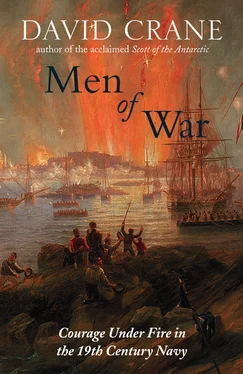This is an aggravated case of insubordination. The Board are indispensably called upon to remove Captain Frank Hastings from the list of commissioned officers in the Navy. Acqt. Sir H. Popham accordingly, & inform him also that their Lds. entirely approve the conduct of Capt Parker in refraining from noticing the challenge conveyed to him by Mr Hastings in any other manner than by transmitting it to the Rear Admiral for his information, and they desire it to be understood that even if it should be repeated at any future period, the acceptance of it on the part of Captain Parker would in their Lds’ estimation be highly improper and would incur their severe displeasure.
It was the end of Frank Hastings’s Royal Naval career.
II
If ever a man was doomed by birth it was Frank Abney Hastings. In the weeks and months after the Kangaroo incident, there was scarcely a day when one word of apology could not have saved his career, when a single gesture of moderation or even cautious self-interest could not have redeemed his reputation; but he was quite simply incapable of making it. ‘Your Lordship may find officers that will submit to such language,’ he wrote instead to Lord Melville, the First Lord of the Admiralty,
but I don’t envy them their dear purchased rank & God forbid the British Navy should have no better supporters of its character than such contemptible creatures. A great stress has been layed upon the circumstance of the challenge being delivered to Capt Parker on the Quarter deck, but … why the contents of a sealed challenge should be known to bystanders any more than the contents of a dinner invitation I confess myself at a loss to divine.
If this was hardly the language of conciliation or compromise, the truth was that there was nothing in Hastings’s temperament or background that would have counselled a place for either. For six hundred years the Hastings family had amassed titles and lands with a daring promiscuity, alternately the favourites and the victims of successive English monarchs to whom they were too closely related for comfort, safety or humility. ‘Though the noble Earl was sprung from ancestors the most noble that this Kingdom could boast,’ the Gentleman’s Magazine wrote in 1789 on the death of Frank’s grandfather, the 10th Earl of Huntingdon,
Plantagenet, Hastings, Beauchamp, Neville, Stafford, Devereux, Pole, Stanley, it might be said also that they were most unfortunate. The Duke of Gloucester was strangled at Calais. The Duke of Clarence was put to death privately [fine word, ‘private’] in the Tower. The Countess of Salisbury, his daughter, was publicly beheaded, as was also her son … Henry Stafford, Duke of Buckingham, was beheaded by Richard III. Robert Devereux, the famous Earl of Essex, died on a scaffold in the reign of Queen Elizabeth. The untimely deaths of the gallant Nevilles are sufficiently known. The founder of the Huntingdon family, William Lord Hastings, lost his head in the Tower …
No family that includes Warwick the Kingmaker and Essex can put such a record entirely down to ill-luck, and it sometimes seems as if the Hastings went out of their way to import vices that were not already indigenous to the tribe. From the sixteenth century onwards there had been a distinct streak of religious extremism in the family, and in the seventeenth fanaticism was wedded to real madness with the marriage of the 5th Earl to Lucy Davies, a niece of the Lord Castlehaven beheaded for sodomy and abetting the rape of his wife, and the devoted daughter of that notorious prophetess, Bedlamite and ‘abominable stinking great Symnell face excrement’ of Stuart England, Lady Eleanor Davies.
To marry into one unstable family might be a misfortune, but to marry into two smacks of something more culpable, and to the toxic infusion of Castlehaven’s Touchet blood in the seventeenth century was added that of the Shirleys in the eighteenth. This latter alliance came at a time when some of the old Hastings energy seemed at last to be dissipating, but in the tyrannical and litigious Selina Shirley, Countess of Huntingdon – cousin of the Earl Ferrers hanged for murder, founder of the religious cult bearing her name and, by turns, Wesleyan, mystic, ritualist and damnation-breathing Calvinist – the Hastings could again boast a figure to hold her bigoted own with any in the family’s long and bloody history.
It is astonishing, in fact, how successfully the Hastings clan came through an Augustan age of Lord Chesterfield, ‘manners’ and rhyming couplets and emerged on the other side with all their traditions of violence and excess so wonderfully intact. In a letter to Warren Hastings – no relative but a close friend – Frank’s father once cheerfully confessed to their ‘naturally hot and spicy’ blood, and whether they were Calvinist or atheists, shooting themselves or shooting their steward, hanging rebels in America or being hanged at Tyburn, the young Frank’s immediate family bequeathed to him a tradition of volatility that found its inevitable echo in his challenge to Captain Hyde Parker.
Throughout his life Frank would be abnormally sensitive to the claims of a family that, in its more modest moments, traced its ancestry back ‘eleven hundred years before Christ’, and for him there was a twist that might well have added a morbid prickliness to the natural Hastings hauteur. From the first creation of the earldom in the sixteenth century the Huntingdon title had descended in more or less regulation mode to the middle of the eighteenth, but when the 9th Earl died of a fit of apoplexy in 1746, he was succeeded by a seventeen-year-old son whose well-publicised contempt for women of a marriageable class had soon eased him into the arms of the Parisian ballerina and ‘first dancer of the universe’, Louise – ‘La Lanilla’ – Madeleine Lany.
The result of that ‘Philosophical and merely sentimental commerce’, as his friend and moral guide Lord Chesterfield silkily put it, was a baby boy born on 11 March 1752. By the time this ‘young Ascanius’ arrived in the world ‘La Lanilla’ had already been abandoned, and while Huntingdon continued his philosophical and sentimental education on a diet of Spanish paintings and Italian women, the infant Charles was removed from France and sent over to Ireland to be brought up ‘as brothers’ with his cousin Francis Rawdon, the future 2nd Lord Moira in the Irish Peerage, Baron Rawdon in the English, 1st Marquis of Hastings and Governor General of India.
Of all the generations of Hastings who shaped Frank’s future, Charles Hastings – his father – is infinitely the most engaging. There seems little now that can be known of his early childhood, but in 1770 he was bought a commission in the 12th of Foot, and over the next twenty years enjoyed as successful a career as was possible at that nadir of British army fortunes, distinguishing himself in America and at the siege of Gibraltar before finally rising by purchase and patronage to the rank of lieutenant general and the colonelcy of his old regiment.
With the powerful Hastings connections behind him, the friendship of the Prince of Wales, and a pedigree and personality that might have been designed for the louche world of Carlton House, the only things missing from Charles’s life were the title that went into abeyance on the Earl’s death in 1789 and the fortune and family seat that passed to his Moira cousin. He would have to wait another sixteen years for the minor compensation of a baronetcy, but in the year after his father’s death he augmented his modest inheritance by marriage to a Parnell Abney, the sole daughter and heiress of Thomas Abney of Willesley Hall, a handsome but dilapidated estate with a landscaped park and ornamental lake just two miles south of the historical Hastings power base at Ashby-de-la-Zouch.
Читать дальше











